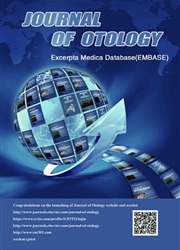

 中文摘要:
中文摘要:
目的 调查河南省安阳地区重度感音神经性耳聋聋病分子病因学情况。方法对安阳市聋哑学校160名学生进行耳聋病因问卷调查、纯音听阈测试。对其中154名非综合征性感音神经性耳聋患者进行线粒体DNA 12SrDNA A1555G点突变检测和G朋12基因突变检测。结果 8例(5.19%)存在线粒体DNA 12SrDNA A1555G点突变;11例(7.14%)存在GJB2 235delC纯合突变;13例(8.44%)存在GJB2 235delC杂合突变。在分子水平能够明确诊断者占20.77%。结论 安阳地区耳聋患者存在较高的遗传性耳聋发生率。特别是线粒体DNA A1555G突变发生率高于全国平均水平,通过聋病分子诊断,可达到防聋、指导聋儿康复及评估耳聋预后等积极效果。
 英文摘要:
英文摘要:
Objective To conduct a survey of the etiologic causes of severe-profound hearing loss in Anyang, Henan, Methods The hearing loss evaluation, etiologic survey and the molecular genetic analysis of common genes responsible for deafness were performed in 154 nonsyndromic hearing impairment students at Anyang Deaf School. Results Of 154 patients with nonsyndromic heating impairment (NSHI) eight (5.19%) were found to carry the mtDNA A1555G mutation; 11 cases(7.14%) were shown to carry the GJB2 235delC homozygous mutation and 13 cases (8.44%), to carry the GJB2 235delC heterozygous mutation. Condusions There are a high frequency of mitochondrial DNA and GJB2 gene mutations among patients with NSHI in Anyang, Henan. Molecular genetic screening for these mutations and genetic counseling are effective methods to prevent the occurrence of hereditary hearing loss.
 同期刊论文项目
同期刊论文项目
 同项目期刊论文
同项目期刊论文
 Extremely low penetrance of deafness associated with the mitochondrial 12S rRNA mutation in 16 Chine
Extremely low penetrance of deafness associated with the mitochondrial 12S rRNA mutation in 16 Chine Extremely low penetrance of deafness associated with the mitochondrial 12S rRNA T1095C mutation in t
Extremely low penetrance of deafness associated with the mitochondrial 12S rRNA T1095C mutation in t The mitochondrial tRNAAla T5628C variant may have a modifying role in the phenotypic manifestation o
The mitochondrial tRNAAla T5628C variant may have a modifying role in the phenotypic manifestation o Molecular Etiology of Hearing Impairment in Inner Mongolia: mutations in SLC26A4 gene and relevant p
Molecular Etiology of Hearing Impairment in Inner Mongolia: mutations in SLC26A4 gene and relevant p Construction of a multiplex allele-specific PCR-based universal array (ASPUA) and its application to
Construction of a multiplex allele-specific PCR-based universal array (ASPUA) and its application to 期刊信息
期刊信息
